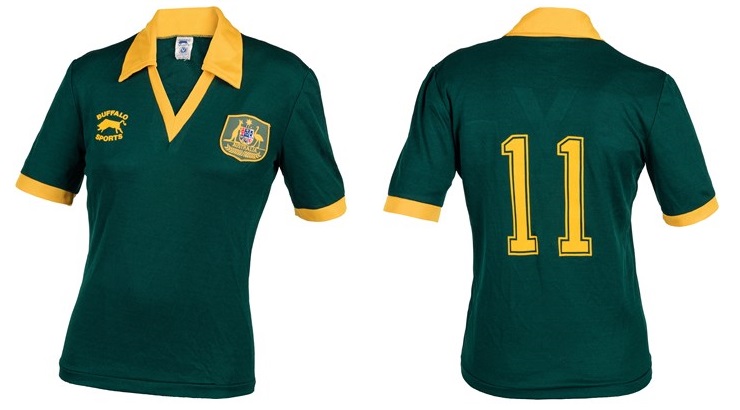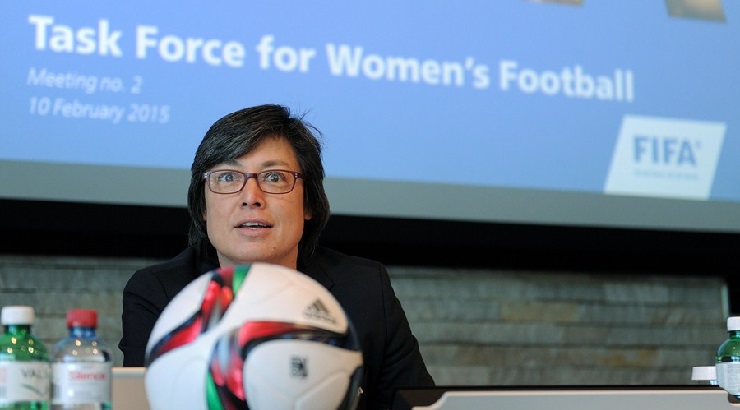Moya Dodd On FIFA, Women Soccer Coaches and the World Of Soccer
A former Australian National Team midfielder, Moya Dodd is Vice President of the Asian Football Confederation, Board Member of the Football Federation Australia, member of the International Council of Arbitration for Sport, partner in law at Gilbert + Tobin, and most inspiring, one of the few women to ever be appointed to FIFA’s Executive Committee. An advocate for the women’s game for nearly 30 years, Dodd is the new voice of soccer and the person who can shatter the grass ceiling.
Moya Dodd is one of the few women in FIFA’s top leadership and is the chair of the FIFA Task Force for Women’s Football. Poised and serene, Dodd embodies the new voice of soccer – one reflecting a worldly view on the planet’s favorite sport with the keen insight that women deserve to be part of the decision making process in soccer. Dodd clearly speaks out as an advocate for women in soccer and wants to shatter the grass ceiling that still holds back women’s soccer. Citing a lack of investment and male-dominated leadership that has long ignored the serious gender gap prevalent in soccer, Dodd is the voice of change.
A uniquely accomplished woman in the world of soccer; Dodd is one of the few women on the FIFA executive member — the male bastion of soccer. While it may be hard to believe, FIFA is a 112-year-old institution which only started to recognize women’s soccer a few decades ago.
RELATED COVERAGE: MOYA DODD ON SOCCER: WOMEN NEED TO BE INCLUDED
Fresh off a plane from Switzerland and the majestic FIFA Ballon d’Or ceremony, Dodd flew to Baltimore to be a part of the 75th National Soccer Coaches Association of America (NSCAA) Convention and took time to attend “Women’s Leadership in Soccer” featuring Amanda Vandervort, Senior Director of Social Media, Major League Soccer; Louise Waxler, Executive Director, McLean Youth Soccer; Laurie Whitsel, Ph.D., Director of Policy Research, American Heart Association; Lynn Berling-Manuel, Chief Executive Officer, NSCAA; Marlene Bjornsrud, Executive Director, Alliance of Women Coaches and Janet Rayfield, Head Women’s Coach, University of Illinois — as well as speak with the press.
Diane Scavuzzo had a chance to interview Dodd on women in soccer and FIFA’s effort to gain some gender equality.
Question: How was the Ballon d’Or?
Moya Dodd: It was quite great for your county. I don’t think you Americans can have any complaints, congratulations!
I think the Ballon d’Or after a Women’s World Cup is always great because women’s soccer is on top of everyone’s mind. To see Carli Lloyd win FIFA Women’s World Player of the Year and for United State’s Women’s National Team coach Jill Ellis to be awarded the Women’s FIFA World Coach of the Year in Zurich I thought was great.

Question: What do you think about women’s soccer in general?
Moya Dodd: It’s interesting that women’s coaches have won most of the world’s major tournaments this century and those who kind of doubt the ability of women coaches to perform on the big stage only needs the results board for the last several world cups and Olympic tournaments.
Question: What do you think is the biggest problem for Women in Soccer?
Moya Dodd: I think women have the biggest opportunity for soccer in terms of participation and in terms of the contribution they can bring off the field.
In terms of participation, that’s a growth opportunity, that’s getting more people to play the game.
I know the United States is well ahead of most other parts of the world in that regard, probably thanks to Title IX, but when you look at the participation data, it’s streaking ahead of even very established football nations.
For example, the United States participation rate is miles ahead of South America. Why? Because you have a law that says you have to give people equal opportunity.
Opportunity is what drives participation.
It’s not that women aren’t interested in playing soccer. It’s that the opportunity hasn’t opened up for them. When you create that opportunity, they are there. We’ve seen that on the field and I hope we will increasingly see that off the field in roles like management, marketing, media, coaching especially, and in the board room.
The opportunity for the game to exploit a whole talent pool, instead of half of it, is the reason why I say participation and contribution are the biggest opportunity for women in soccer.

Question: You are a champion of change and reform from within the game. Is this a role you wanted?
Moya Dodd: I didn’t set out to cast myself that way, but I do set out to make a difference.
Zurich is a long way from Sydney. It’s 34 degrees in the summer right now at home so if I’m not there, I want to be doing something useful. I really think that if you are in a position, then you carry the responsibility of that position. That responsibility is to make a contribution and do what you can to bring positive change.
I think the opportunity to contribute arose in 2015 in a way that no one really imagined.
Question: Do you see women as part of the rebirth of FIFA?
Moya Dodd: The evidence is piling up in the corporate world that diversity does bring about better decision making in corporations and governments. That’s why governments all around the world are looking at 30 percent targets for women in the boardrooms of corporations.
There is no doubt FIFA needs to change. I think it’s widely known in FIFA that it needs to change. Women need to be part of that change.
I think better decision-making is something that FIFIA needs and in an environment that has been so overwhelmingly male for so long, its clear that gender diversity is a big facilitator of positive change. That’s not the only kind of diversity, but for FIFA I would put it at the top of the list.
Question: Can you discuss FIFA’s desire to have more gender equality in soccer?
Moya Dodd: As you know, there has been some changes on the FIFA Executive Board, so the environment has changed and no doubt it will change again when there is another president coming into the chair in February. I don’t have a crystal ball, but I can tell you that many of the stakeholders in the United States were those who came forward first and loudest in support of it.
Sunil Galati, president of the United States Soccer Federation, is hugely supportive of this effort.
Obviously, you’ve heard women soccer players and ex-players were instrumental in supporting the proposals that we made. Julie Foudy is one and there’s a long list of current and former US professional team players who support this.
The cry for gender equality went beyond women’s soccer, and got bigger than soccer and bigger than sports.
Question: What do you think is the biggest challenge for female coaches?
Moya Dodd: The selection panel is the biggest challenge for female coaches.
Female coaches aren’t seen as a good long-term investment. If you invest in a female coach, you mentor her, you support her and you give her opportunities – chances are she’s not going to get head hunted to the local men’s team.
She’s probably going to be in the women’s game for a longer period of time. She will bring that experience and that quality, and longevity to the squad. It’s called retention in the business world. You’re going to retain that coach, having invested in her but the growth opportunities she faces have been limited.
Question: Do you have any advice for female coaches?
Moya Dodd: I would say be confident in your abilities, because …
I see so many wildly qualified female coaches who are given very small opportunities to begin with — and they are almost never given the opportunity to coach men’s soccer — which is also where most of the money is.
So, most of the available wage pool is foreclosed to them. That’s before you even begin. But don’t let the many issues stop you from putting your head up. Be confident and put yourself forward for those jobs. You’re probably a whole lot better than you acknowledge that you are.

Did you know? More On Moya Dodd
Highly passionate and supportive of soccer, Dodd fell in love with the sport as a young girl when she caught a glimpse of the beautiful game on TV. This moment ignited a lifelong passion for the game of soccer.
A former pro soccer player-turned-lawyer, Dodd remains a champion of the game and an advocate of for soccer. Now, as a member of FIFA’s 27-member executive board, Dodd is often referred to as the most influential Australian in soccer. Dodd has even motivated FIFA to seek for greater inclusion and participation of women in soccer.
Dodd’s proposal on to FIFA on football and women: Why reform must specify inclusion and investment rocked the soccer world when submitted in October 2015. It stated that women must be included in decision-making. This is a must read for leaders of the soccer world.
Dodd grew up in Australia and enjoyed a stunning youth soccer career as State Champion. A powerhouse midfielder, Dodd became vice captain of the Australian women’s national team from 1985-95. In 1986, Dodd gained her first call up to the Australian National Team for their game against Chinese Taipei.
1988 was an important milestone for Dodd. Not only did she earn her Bachelor of Laws with Honors in Media Law from Adelaide University, but also represented Australia in the first ever FIFA International Women’s Football Tournament, where they defeated Brazil, 1-0 in the opening game. That tournament would make history, and pave the way for women’s soccer – as an instant need for the women’s game was confirmed and the tournament was considered a success: 18 days later FIFA approved the launch of the Women’s World Cup, which would take place in 1991.
Dodd played domestically and internationally until 1995, and then pursued her career in law at Telstra Multimedia, NECG and Gilbert + Tobin Lawyers. In 2007, Dodd joined the board of the Football Federation Australia and two years later was elected vice-president of the Asian Football Confederation. In 2013, Dodd was appointed to FIFA’s executive committee.
This article was written with the help of Andrea Garcia, Chris Rael among others who worked on this editorial. SoccerToday’s Diane Scavuzzo and other media outlets spoke with Dodd in a group interview setting at NSCAA.








